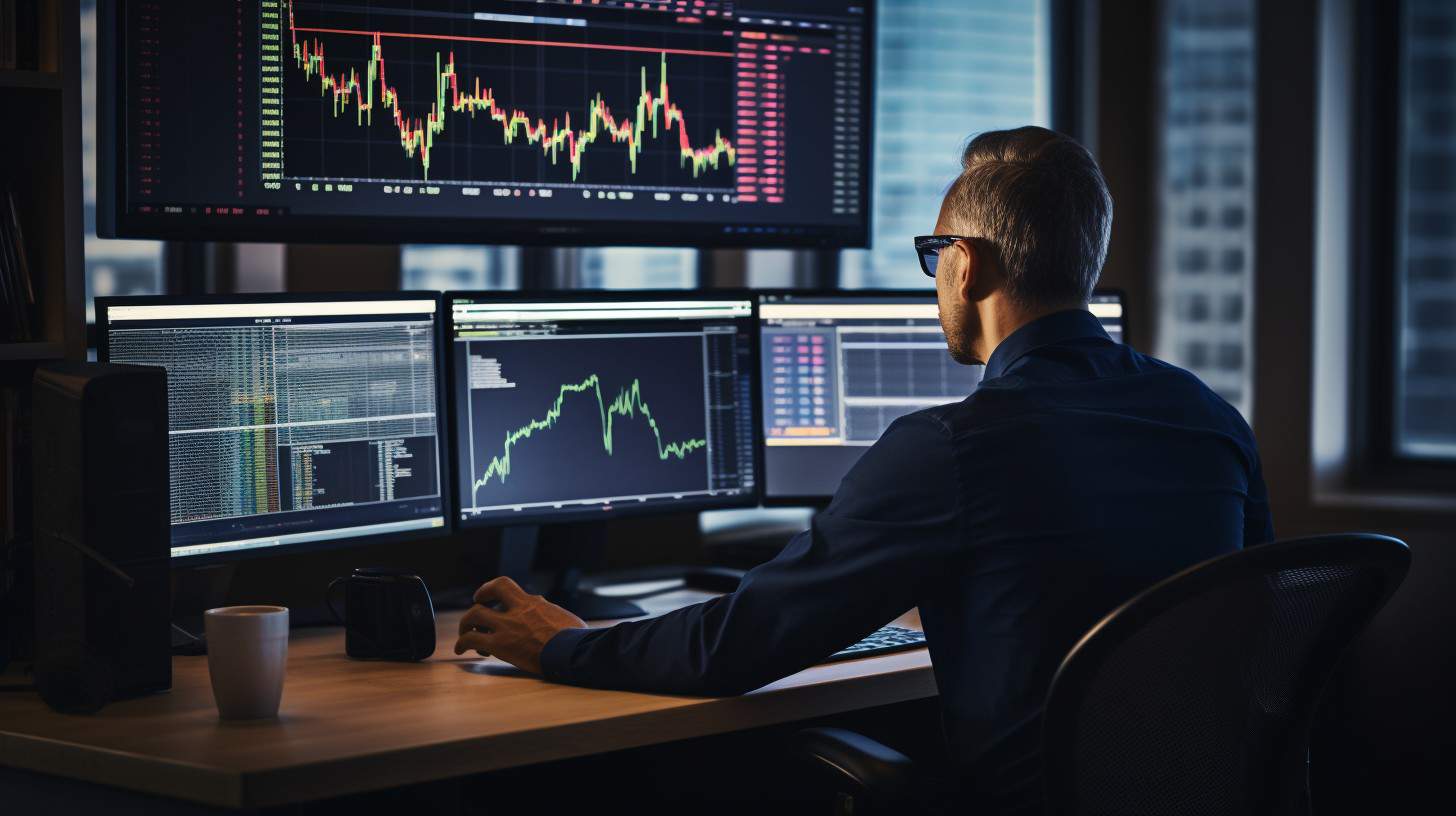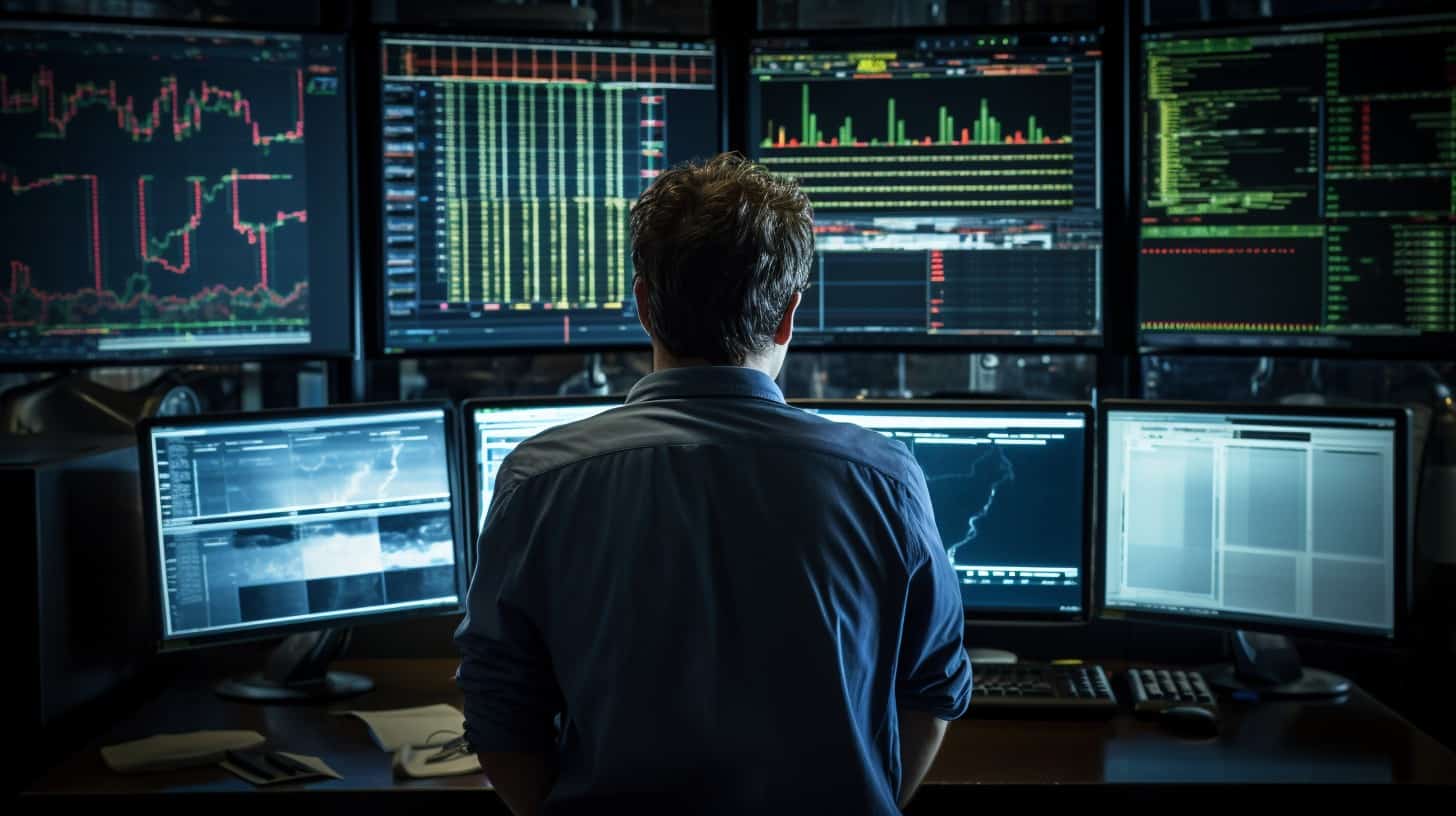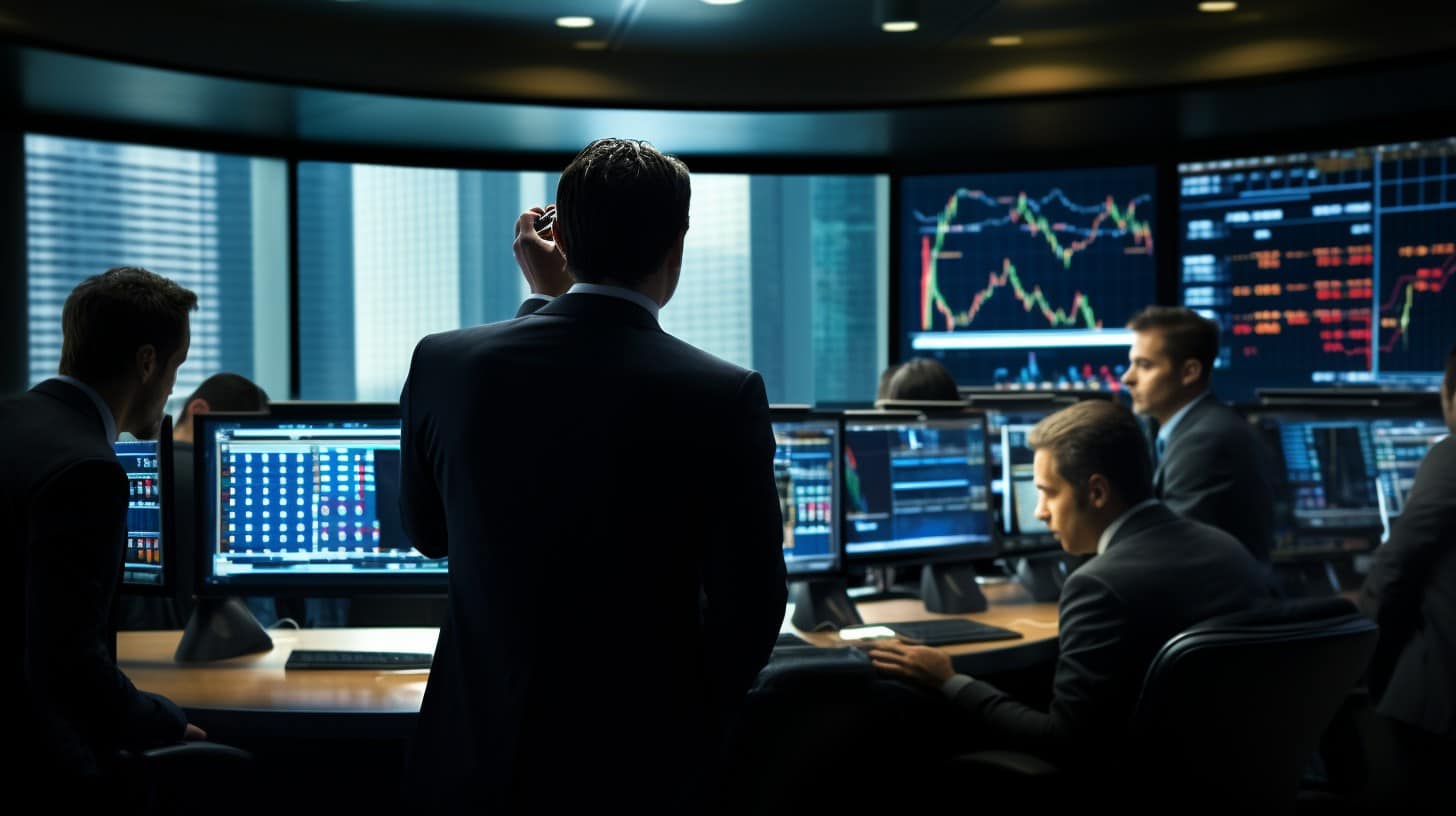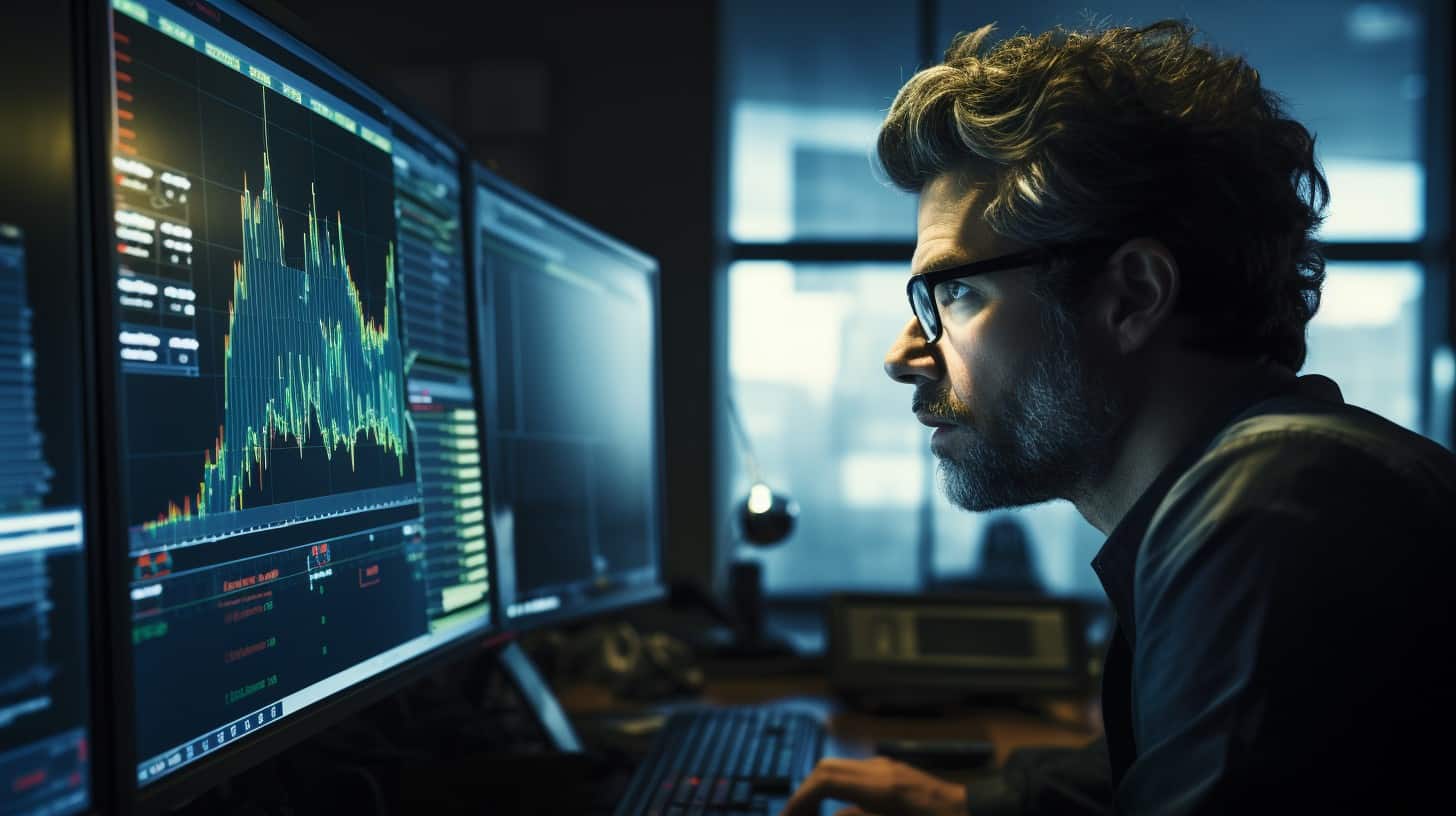I completely understand how navigating the forex market feels like unraveling a mystery written in an ancient language. Just like you, I’ve grappled with those dizzying charts and the wild price swings that can flip your financial fate from fortune to fumble in mere moments.
Imagine diving into a deep blue sea of finance where $5 trillion pulsates through its currents every single day—that’s the forex for you. With grit and ample curiosity, I’ve poured over data and patterns to map out a solid strategy for trading success.
Within this blog is your personal guide—a treasure map, if you will—to unlocking the secrets of forex strategies. So stay with me; let’s set sail together, and we’ll uncover that elusive ‘X’ marking sweet victory!
Key Takeaways
To become great at forex trading, you need to learn a lot and practice often. Use demo accounts to test your strategies without risking real money.
Have clear rules for when you buy and sell. Set stop-loss orders to protect your money from big losses. Don’t let emotions like fear or greed make you trade too much.
Understand the markets by studying technical analysis (charts) and fundamental analysis (news). Also, pay attention to sentiment analysis, which shows what other traders feel about the market.
Choosing the right broker is very important. Make sure they are approved by financial groups, offer easy-to-use tools, good customer service, and fast order filling.
Keep control over how you feel during trading. Stay calm so that you can think clearly and stick with your plan even when it gets tough.
Table of Contents
Understanding a Forex God

A Forex God isn’t just lucky; they’re super skilled at making money in the foreign exchange market. They know a lot about different countries’ currencies and how these values can change.
This trader doesn’t just guess; they use special methods to decide when to buy or sell. Their secret weapons are things like looking at news that affects money and using charts to spot patterns.
Being a Forex God also means staying cool and not letting feelings mess up their plans. They pay close attention to market sentiment, which is how people feel about the currency markets.
If traders are scared, prices might drop. If they’re excited, prices could go up. A Forex God uses this info to make smart moves and avoid common mistakes that can lead to losing money.
Key Traits of a Successful Forex Trader

Within the high-stakes arena of foreign exchange trading, certain traits set apart the amateurs from those I like to call Forex Gods. It’s not just about making quick decisions; it’s a blend of razor-sharp proficiency and an almost zen-like state of mind that empowers these traders to navigate tumultuous financial waters with finesse and acuity.
Skill and Knowledge
I understand that to be a Forex God, you need lots of skill and knowledge. It’s not just about reading charts and guessing. You’ve got to study the markets, know how different news affects currencies, and get familiar with financial terms used in forex trading.
Think of big names like George Soros or Paul Tudor Jones; they all started by learning the basics before they made it big.
You also must keep growing your skills. This means continuous learning is key. Take time each day to read up on new strategies and see what other successful traders are doing. Join forums where people talk about forex trading, watch tutorials online, or go through training courses offered by many brokers.
Next up is mastering discipline and patience—without them, even the smartest traders can struggle.
Discipline and Patience
Being a Forex God isn’t just about smart moves; it’s also about staying cool and waiting for the right time. You have to handle your trades with care, like tending a garden. This means having the discipline to stick to your trading plan and the patience not to jump on every move.
Markets can be tricky, and they test you. Sometimes, sitting tight is the best move.
To master risk management in forex trading, these two traits are your best tools. They help you wait for the perfect trade setup and keep you from making hasty decisions that can lead to big losses.
Next, let’s look into how managing risks keeps your money safe while you aim for success in the financial markets.
Risk Management
I know handling money can be tough, especially in forex trading. Good risk management keeps my cash safe and stops big losses. It means setting limit rules on how much I’ll bet on each trade and sticking to them.
Think of it like this: I wouldn’t put all my gaming money into one round because if I lost, it’d be game over.
For me, being smart about risks is like wearing armor in battle – it might not stop every arrow, but it sure helps survive the fight. Next up is figuring out how to walk the path of a forex god with education and training.
The Path to Becoming a Forex God

Embracing the journey towards forex mastery unveils transformative strategies and insights that empower traders to harness the market’s potential—stay tuned to uncover how this path unfolds.
Education and Training
I want to talk about how you can become a pro at forex trading. It’s like leveling up in a game, but this game can earn you real money from your computer.
- Start by hitting the books to learn forex basics. You need to know how markets work and what moves them.
- Get yourself deep into studying currency pairs and their behaviors. This means understanding why they change based on news or events.
- Practicing with demo accounts is like a training mission before the real deal. Use it to try out your strategies without risks.
- Create a smart trading plan and stick to it. Like in gaming, having a strategy gives you an edge over just button-mashing.
- Make risk management your best friend. Learn how much money you can afford to risk and set stop-loss orders to protect it.
- Analyze past trades in a trading journal; it’s like replaying levels to see where you went wrong and how to win next time.
- Stay sharp with webinars, online courses, and forums from trusted places like eToro or Forex brokers with straight-through processing tech—IG Group comes to mind.
- Keep tabs on financial news—it can help you make better trades if you understand stuff like central bank decisions or exchange rates.
- Don’t skip on emotional control training too; meditation might sound weird, but staying calm helps a ton when trading gets tense.
Choosing the Right Broker
After learning about trading, the next step is finding a good broker to work with. A broker is like a gatekeeper to the Forex market. Here’s how to choose one:
- Check their background – Make sure your broker is approved by important financial groups like the CFTC or CySEC. This tells you they follow rules that protect traders.
- Look for user-friendly tools – The best brokers give you easy-to-use platforms like MetaTrader 4. You want quick and simple ways to look at prices and make trades.
- Test their customer service – Try asking the support team some questions to see how fast and helpful they are. Good support can be super useful if you run into problems.
- Learn about account options – Some brokers offer different types of accounts based on how much money you put in. Pick one that matches your style and budget.
- Read about extra costs – Know all about any fees for things like taking out money or not trading enough. You don’t want any surprises with your cash.
- Research their speed – In Forex, timing is everything, so find a broker that fills your orders super fast.
- Find out about leverage – This means borrowing money from the broker to make bigger trades. Just be careful because it also means higher risk.
- Start with a demo account – Before putting in real money, practice with fake money in a demo account to get used to how everything works.
Developing a Trading Strategy
I want to share my journey to create a strong trading strategy. It’s important for success in the forex market.
- Learn non-stop. I read books, watch videos, and take courses on forex trading to build my skills.
- Practice makes perfect. I use demo accounts to try out my trades without risking real money.
- Understanding charts is key. I study technical analysis to spot trends and make good decisions.
- World news matters. I follow events that can change currency prices and use fundamental analysis.
- Small steps are best at first. I start with tiny trades before risking more money.
- Keeping a journal helps. I write down what works and what doesn’t to improve my strategy.
- Emotions stay out of it. Managing stress and staying calm helps me stick to my plan.
- Rules are friends. I set clear rules for when to enter or exit a trade so emotions don’t decide for me.
- Safety first with risk management. Setting stop-loss orders protects me from big losses.
- Learning from mistakes is smart. Every loss teaches me something that can help me win later.
- Patience pays off. Rushing leads to mistakes, so I wait for the right time to trade.
Common Pitfalls in Forex Trading

Even the most promising journey through the Forex markets can be fraught with hidden snares, ready to trip up traders at every turn. Recognizing these common pitfalls in Forex trading is a critical step toward safeguarding your portfolio and ensuring your strategy isn’t derailed by easily avoidable mistakes.
Overtrading
I need to talk about overtrading because it’s a big trap for many forex traders. Overtrading means you’re buying and selling currencies too much. You might think more trades equal more chances to make money gaming the system or earn cash from home, but that’s not true.
Too many trades can eat up your money with fees, and worse, they can lead us to lose big.
We often overtrade because we let our feelings push us around. Greed tells us to keep going when we should stop; fear makes us jump out of good trades too early. To be like those top investors like Stanley Druckenmiller or Nick Leeson without their famous downfalls, we’ve got to stick to our trading strategies.
We need a clear head, sharp focus on risk management, and discipline – these are our best tools against the urge to overtrade in the exciting world of currency exchange rates and CFDS.
Ignoring Stop-Loss Orders
Stop-loss orders are like safety nets. They help me protect my money when the market goes bad. But some traders don’t use stop-loss orders. This is risky and can lead to big losses.
It’s important to have rules for managing risk in forex trading.
Not using stop-loss orders can also make me trade based on emotions instead of a plan. When I stick to my stop-loss, it keeps me calm and stops me from making quick, bad choices that could hurt my investments.
To be a successful trader, respecting stop-loss orders is one key thing I must do. It helps keep my capital safe so I can keep trading another day.
Lack of Emotional Control
Jumping from ignoring stop-loss orders to the stormy seas of our emotions, let’s dive into how they play a huge role in forex trading. Having control over your feelings is key. If you let fear and greed guide you, they will steer your trades into dangerous waters.
Picture this: A trader sees a chance to make more money and forgets all about their plan. They may buy or sell too much because they’re excited or scared, not because it’s smart.
As traders aiming for success, we must keep cool heads. I work on managing my moods so they don’t mess up my trading strategy. It’s tough sometimes, but staying calm helps me think clearly and make good choices about when to enter or leave a trade.
Staying disciplined with my trading approach is just as important as knowing all about currencies and charts. Emotions are sneaky; if we’re not careful, they can sneak up on us and push us to act without thinking it through – that’s something I always watch out for.
Tools of the Trade: Analyzing Markets

To truly reach the zenith of your Forex trading endeavors, unlocking a mastery over market analysis is non-negotiable. Let’s dive into the art and science behind the core analytical methods that serve as your compass in navigating through the tumultuous tides of currency exchange markets.
Fundamental Analysis
I look at fundamental analysis like it’s a secret detective tool. It helps me see the real story behind forex market moves. I dive into economic reports, news events, and financial statements to understand how these big things change currency prices.
Think of it as connecting the dots between what happens in economies around the world and where currencies might head next.
Exploring data on inflation, interest rates, and employment numbers – that’s my bread and butter in fundamental analysis. It’s all about looking at what can make money values go up or down.
This stuff isn’t just boring numbers; they’re clues that show me how to make smart trades. And remember, with over $5 trillion traded each day in forex, getting these insights right is super important for winning big time!
Technical Analysis
Moving from digging into the core reasons that drive forex movements with fundamental analysis, we now dive into the patterns and charts of technical analysis. This is where I get to play detective in the world of forex trading.
By looking at past price actions and chart patterns, I can make smart guesses about where prices might head next.
Technical analysis is my toolkit for reading market trends and making choices that count. It helps me spot signs like if a currency pair is likely to go up or down. With this knowledge, I set up my trades better and manage risks like a pro.
Mastering these charts and indicators isn’t just useful; it’s what makes some traders stand out as true Forex Gods. They’re not guessing – they’re strategizing with precision, using every line on that chart to their advantage.
Sentiment Analysis
Shifting from charts and numbers, let’s dive into sentiment analysis. This approach looks at the mood of the market. It can tell us what other traders feel about where things are heading.
When I tap into sentiment, I’m trying to get a sense of the crowd’s vibe. Are they scared? Hopeful? You see, sometimes markets move just because people are all leaning one way emotionally.
I use tools like Risk Manager and Trade Panel to help me understand these feelings better. They show me if most traders think prices will rise or fall. This knowledge is powerful because it helps me make smarter choices in my trades.
And here’s something cool: mastering this kind of analysis gets me closer to being a Forex God—the trader who reads both data and emotions to win big in Forex markets.
Mastering the Forex Markets
Mastering the Forex market is like unlocking a secret level in a game, where big wins await. With hard work and smart strategies, you can earn freedom and respect as a trading pro.
Remember, avoid the traps that trip up new traders. Keep learning every day and use the right tools to stay sharp. Let’s conquer forex trading together – it’s time to make your mark!
FAQs About Becoming a Forex God
What do I need to start trading in the forex market?
To start trading in the forex market, you need some money to invest, a good mindset for decision-making, and knowledge about financial derivatives and securities.
Can I make money from home by being a stock trader or forex trader?
Yes! As a stock trader or forex trader, you can trade on stock exchanges like the London Stock Exchange from home as long as you have an internet connection and use social media or other platforms for advertising your expertise.
What’s important to know about risk when trading forex?
It’s very important to understand your own risk tolerance because trading can involve highly leveraged investments. This means there is potential for both large profits and large losses.
Is it better to be a passive investor or an active fund manager?
Being a passive investor involves less stress but may offer lower returns, while being an active fund manager such as working at a hedge fund requires more work and expertise but could lead to bigger rewards if successful trades are made.
How does mental health affect my ability to trade successfully?
Mental health plays a big role in trading success because it affects your mental clarity, stress management, decision-making abilities; practicing self-care helps maintain personal wellbeing which is crucial in high-pressure environments like financial investment.
What happened with Jerome Kerviel and Barings Bank that traders can learn from?
Jerome Kerviel was involved in heavy financial losses due to unauthorized trades much like what happened at Barings Bank; these cases teach traders the importance of following rules set by their Forex brokerage firm and maintaining honest practices within all types of investing including initial coin offerings (ICOs) and exchange-traded funds (ETFs).



